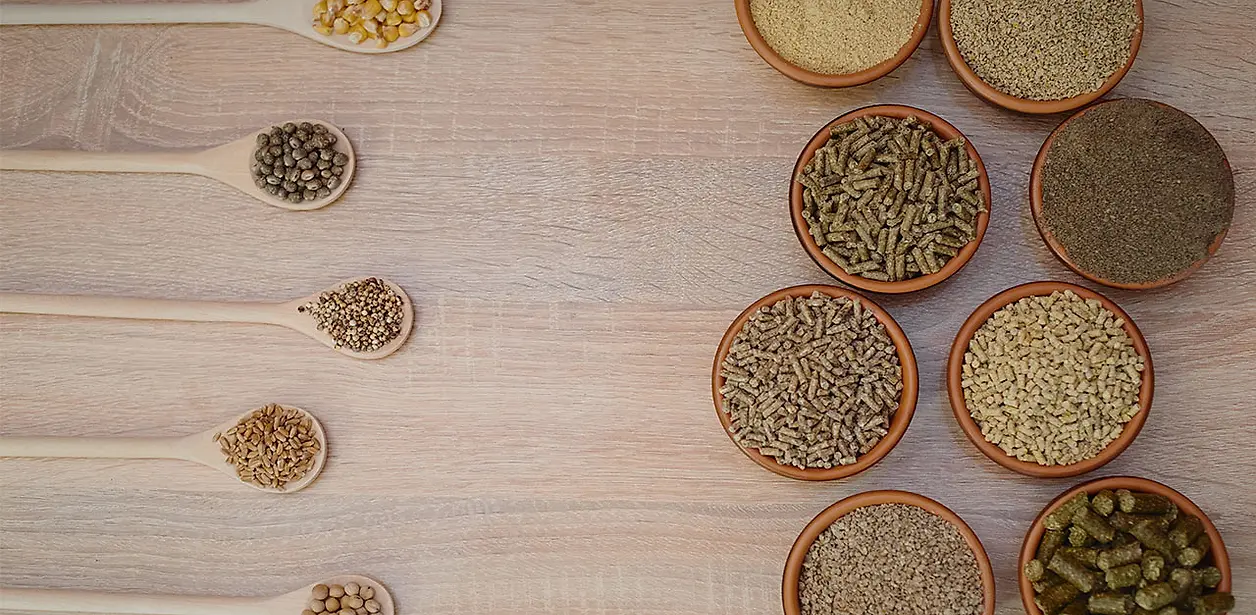ISO 181922 Moisture Profiling in Plant-Based Concentrates
The ISO 181922 standard outlines a precise method for moisture profiling in plant-based concentrates. This service is critical for ensuring the quality and consistency of feed products, especially those derived from plants like soybeans, corn, wheat, or other legumes. Proper moisture content is essential to prevent spoilage, ensure optimal nutrient delivery, and comply with international standards.
Feed manufacturers often use plant-based concentrates as a key component in formulating animal feeds. These concentrates must be stored under controlled conditions to maintain their nutritional value. Excessive or insufficient moisture can lead to mold growth or degradation of essential nutrients. The ISO 181922 method helps monitor and standardize the moisture content, ensuring that feed products meet regulatory requirements and industry standards.
The test involves measuring moisture content at various points within a sample. This profiling technique is particularly useful for large-scale producers who need to ensure uniformity across batches. By identifying variations in moisture content, manufacturers can adjust processing parameters to achieve consistent product quality. This service not only enhances food safety but also supports sustainable practices by minimizing waste and optimizing resource use.
Compliance with this standard is crucial for companies operating in the global market. Many countries have specific regulations regarding feed moisture levels due to concerns about animal health, environmental impact, and consumer safety. ISO 181922 provides a harmonized approach that ensures consistency across borders.
The testing process typically involves taking multiple samples from different parts of the concentrate batch. Each sample is then dried at a specified temperature until it reaches a constant weight. The difference in weight before and after drying reflects the moisture content. Advanced analytical equipment like infrared spectrometers or Karl Fischer titrators are used to achieve high precision.
Understanding the moisture profile of plant-based concentrates also aids in optimizing storage conditions. For instance, if certain areas of a batch show higher than expected moisture levels, adjustments can be made to prevent spoilage during prolonged storage. This proactive approach not only extends product shelf life but also reduces the risk of contamination.
Moreover, moisture profiling helps in identifying any potential issues early on, allowing for corrective actions before they escalate into larger problems. In a broader context, this service contributes significantly to the overall quality control framework within feed manufacturing facilities. It ensures that products meet not only regulatory requirements but also exceed customer expectations.
For R&D engineers and procurement officers, moisture profiling is an invaluable tool for innovation and supply chain management. By having accurate data on moisture content, they can develop more efficient processing techniques or source materials from suppliers who adhere to strict quality standards.
- Environmental Benefits: Reduced waste due to optimized storage conditions
- Economic Efficiency: Lower production costs through better resource utilization
- Health Assurance: Ensured product quality and safety for animal consumption
Why It Matters
The importance of accurate moisture profiling cannot be overstated in the context of plant-based feed concentrates. Moisture levels directly impact the stability, shelf life, and overall quality of these products. Excessive moisture can lead to mold growth and nutrient degradation, while insufficient moisture might result in poor palatability or reduced digestibility.
From a regulatory standpoint, compliance with international standards like ISO 181922 is mandatory for many countries. Failure to meet these requirements could result in product recalls, legal actions, and reputational damage. For companies operating internationally, meeting local regulations is essential to avoid disruptions in trade.
For quality managers and R&D teams, moisture profiling provides critical data that informs process improvements. By identifying variations within a batch, they can pinpoint areas for optimization, leading to more efficient manufacturing processes and improved product consistency. This not only enhances the competitive edge but also contributes positively to consumer trust and satisfaction.
The economic implications of improper moisture management are significant. Excess or deficient moisture can lead to increased production costs due to spoilage and reprocessing. Efficient moisture profiling helps minimize these expenses while ensuring consistent quality across all batches. This economic benefit is further amplified by the reduction in waste, which translates into cost savings for both raw material procurement and final product distribution.
The health aspect of this service should not be overlooked. Ensuring proper moisture levels guarantees that feed products are safe for animal consumption, promoting optimal growth and development. Inadequate moisture can lead to nutritional deficiencies or even toxicity issues, which have severe implications for animal health and welfare.
Customer Impact and Satisfaction
Providing accurate moisture profiling services directly impacts customer satisfaction by ensuring the highest quality feed products. Customers expect consistency in product performance, safety, and reliability. By adhering to ISO 181922 standards, we deliver feeds that meet or exceed these expectations.
The data generated from our moisture profiling helps customers make informed decisions about their procurement practices. With detailed reports on moisture content across different samples, they can better manage inventory levels and avoid costly disruptions caused by spoilage. This transparency also builds trust between suppliers and buyers.
For R&D teams within customer organizations, the insights gained from our profiling services contribute to continuous improvement efforts. Understanding variations in moisture content allows them to refine formulations and develop more robust feed products tailored to specific animal needs. This collaborative approach ensures that both parties benefit from enhanced product performance and innovation.
In terms of economic impact, accurate moisture profiling translates into significant savings for customers. Reduced waste means lower operational costs, which can be passed on to end consumers as cost-effective feeds. Additionally, improved quality control through this service enhances brand reputation, fostering long-term relationships with satisfied clients.
Environmental and Sustainability Contributions
- Reduction in Spoilage: Proper moisture management minimizes waste by ensuring products remain stable during storage and transportation.
- Energy Efficiency: Efficient drying processes reduce energy consumption, contributing to lower carbon footprints.
- Resource Optimization: By identifying optimal moisture levels, resources are used more effectively, reducing unnecessary inputs.





